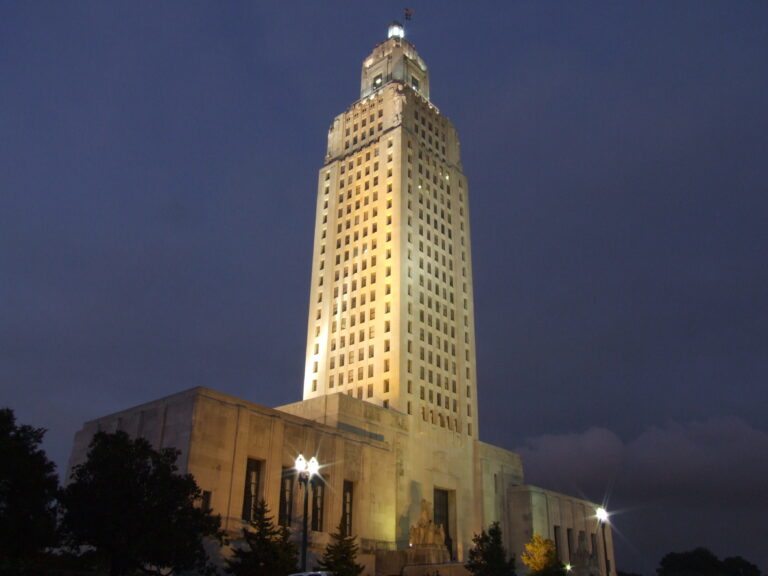By: Julie O’Donoghue – Louisiana Illuminator
Louisiana lawmakers are no longer looking to broadly lift restrictions on gifts to elected officials and public employees while doing their jobs, but they still appear intent on discouraging ethics investigations.
Rep. Beau Beaullieu, R-Iberia, removed language from House Bill 674 that would have allowed public servants to receive $200 worth of gifts annually. This would have applied to all local and state government employees, from a local police officer to the governor.
Instead, Beaullieu has rewritten the legislation to keep a portion of a current limitation on government worker gifts in place. Now, gifts that aren’t food would be mostly restricted to $200 worth of flowers or a charitable donation to express sympathy for a family death.
New allowances for “seasonal” food and beverages remain in the bill, however. Under current law, most public officials are not supposed to receive food and drink as gifts unless it’s at a party or reception.
Under existing rules, they have to consume the food in person at the event where it is given. The edible gift can cost no more than $79 per person, a cutoff the Louisiana Board of Ethics adjusts every year based on the Consumer Price Index.
Beaullieu’s updated proposal would allow elected leaders and public employees to also take seasonal or holiday foods as gifts for a religious or state holiday, even outside of a party or reception. The cap on food gifts would also be $79 per person per holiday or whatever new price the ethics board adopts in future years.
Besides the gift policy changes, Beaullieu’s bill contains several ethics law modifications that would make it much harder for the state ethics board to investigate and charge people with misconduct.
The ethics board oversees enforcement of campaign finance laws and the state ethics code for public employees, elected officials and lobbyists. Anyone from a public school teacher to the governor can be subject of one of its investigations.
The adjustments Beaullieu proposes would require more members of the ethics board to vote in favor of pursuing an investigation and give the board far less time to decide whether a person should be charged with ethical wrongdoing. People accused of ethics violations would also have more ability to push back on the allegations under Beaullieu’s bill.
If the legislation were to pass, the new standards that would have to be met in order for the ethics board to launch an investigation would be very difficult to achieve. For example, the ethics board would have to be confident that wrongdoing had occurred in order to sign off on any preliminary probe into the alleged misconduct.
Ethics Administrator David Bordelon said earlier this month the process Beaullieu seeks would “skew” the process in favor of the public servant accused of wrongdoing. He also took issue with a new restriction Beaullieu proposed Tuesday on ethical investigations and charges. The state representative added language to his bill prohibiting the ethics board from launching an investigation based on information it received through an advisory opinion request.
The board is frequently asked to explain how ethics laws apply in specific situations through advisory opinions. It issues at least a few of these public letters monthly providing feedback.
“If someone submits an advisory opinion request that indicates a violation has already occurred, it should be within the board’s prerogative to initiate an investigation of that,” Bordelon told senators at a committee hearing Tuesday.
Beaullieu said he is trying to overhaul state ethics investigations because many elected officials feel the board has been too aggressive when pursuing allegations.
But the state’s preeminent state government watchdog, the Public Affairs Research Council of Louisiana, has come out strongly against the bill.
“This is designed to make sure we don’t have ethics investigations,” Steven Procopio, the organization’s president, said of the proposed changes.
The legislation is backed by Gov. Jeff Landry, who has had several personal conflicts with the ethics board over his nine years in statewide office.
In 2023, the board charged Landry in 2023 with the ethics violation of failing to disclose flights he took on a political donor’s private plane to Hawaii for an attorneys general conference. That dispute is ongoing because the governor and board members have not reached an agreement on what Landry’s punishment for the violation should be.
Stephen Gelé, the attorney representing Landry in this ethics dispute, also helped write Beaullieu’s legislation to overhaul the state’s ethics laws.
The Louisiana Senate and Governmental Affairs Committee approved the bill Tuesday with no objections. An earlier version of the proposal also passed the Louisiana House unanimously, but both the Senate and the House will have to approve the amended version before it can become law.
It must pass by the Louisiana Legislature’s session adjournment June 12.

